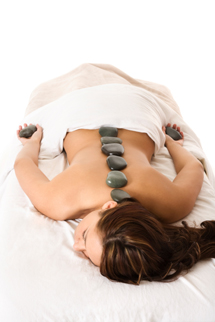Massage Therapy - The Benefits
 Two of the greatest physiological changes produced by
massage therapy are an increase in blood circulation and an increase in lymphatic
fluid circulation.
Two of the greatest physiological changes produced by
massage therapy are an increase in blood circulation and an increase in lymphatic
fluid circulation.
The lymphatic system is essentially the immune system. Massage can increase the effectiveness of the immune system by increasing the distribution of lymphatic fluid.
Increased blood circulation will bring about reduction of swelling; faster healing; lowered heart rate and blood pressure and enhanced overall health.
In the case of injury, either from trauma (e.g. accidents or surgery) or repetitive strain (e.g. poor posture, poor ergonomic design of tools and furniture), a massage therapist can physically stretch muscles, inhibit muscle spasm, increase range of motion of joints and help break down scar tissue. A massage therapist is trained to assess and treat most soft tissues of the human body. (muscles, tendons, ligaments, fascia and other connecting tissue)
If a person's physical or emotional health is challenged, massage therapy can produce benefits whether the situation is acute (immediate) or chronic (long-standing). Many people also use regular massage therapy as a form of body maintenance, receiving massage faithfully for the continuance of good health.
Conditions that may be helped by therapeutic massage
People with the following conditions have reported that therapeutic massage has lessened or relieved many of their symptoms:
- Arthritis
- Asthma
- Back pain
- Carpal Tunnel Syndrome
- Chronic and acute pain
- Fibromyalgia
- Gastrointestinal disorders
- Headaches
- Immune system disorders
- Insomnia
- Joint strains and sprains
- Motor vehicle accidents
- Myofascial pain
- Pregnancy associated problems
- Repetitive strain injuries
- Slow growth of premature infants
- Some circulatory problems
- Sports injuries
- Stress
- Temporomandibular Joint (TMJ) Dysfunction and other jaw problems.
*Information provided by the Canadian Massage Therapist Association
